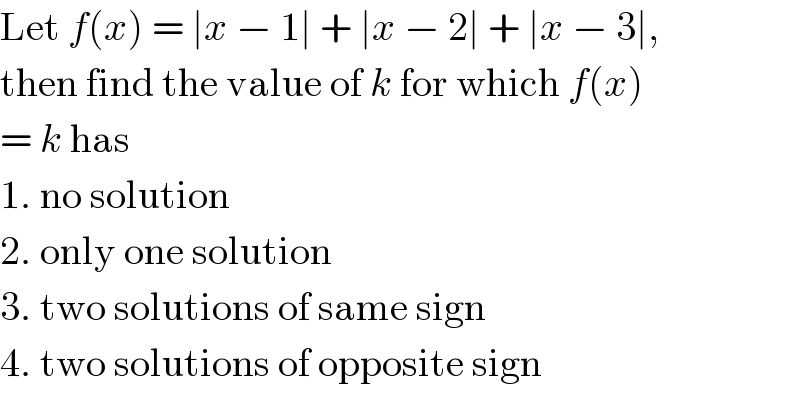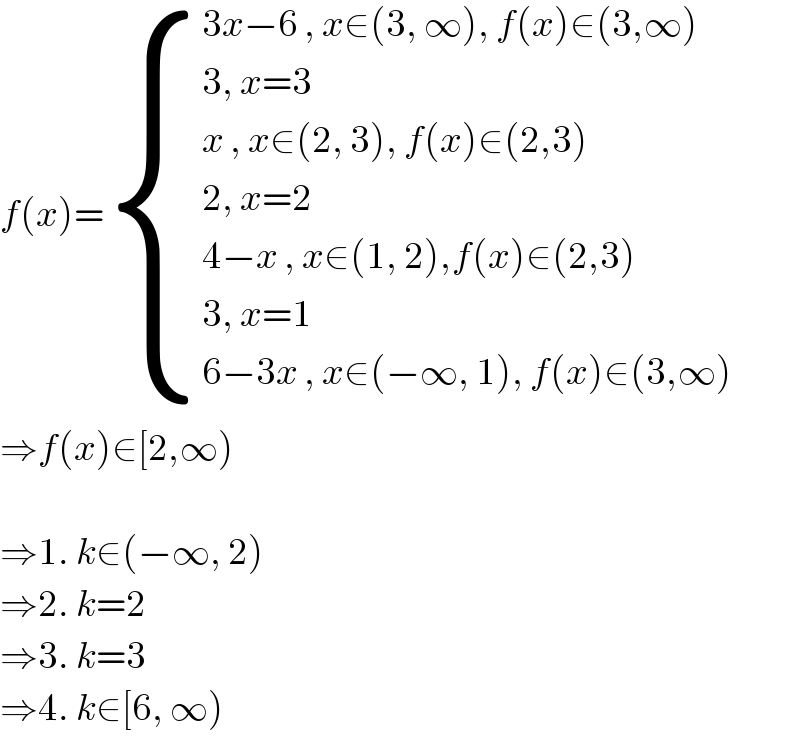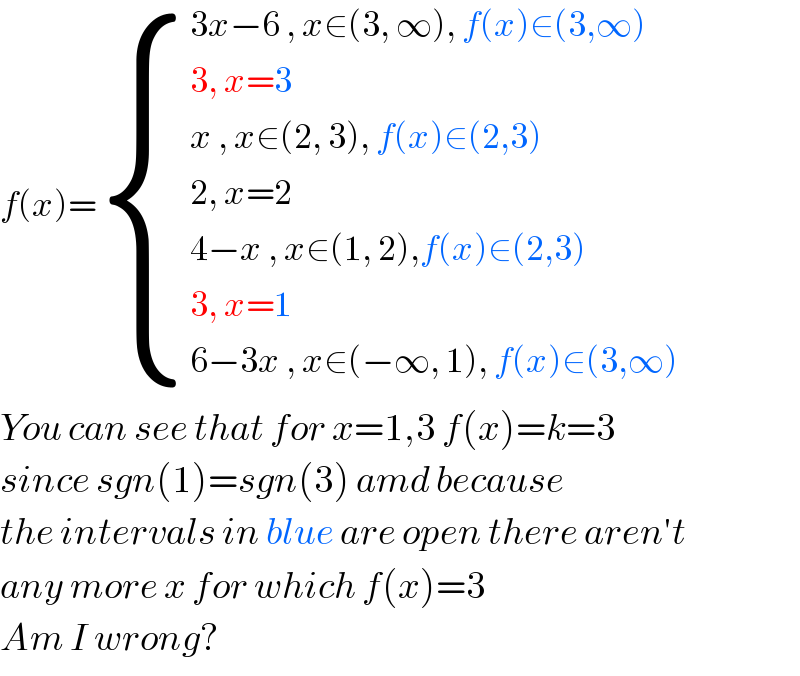
Question Number 21168 by Tinkutara last updated on 15/Sep/17

$$\mathrm{Let}\:{f}\left({x}\right)\:=\:\mid{x}\:−\:\mathrm{1}\mid\:+\:\mid{x}\:−\:\mathrm{2}\mid\:+\:\mid{x}\:−\:\mathrm{3}\mid, \\ $$$$\mathrm{then}\:\mathrm{find}\:\mathrm{the}\:\mathrm{value}\:\mathrm{of}\:{k}\:\mathrm{for}\:\mathrm{which}\:{f}\left({x}\right) \\ $$$$=\:{k}\:\mathrm{has} \\ $$$$\mathrm{1}.\:\mathrm{no}\:\mathrm{solution} \\ $$$$\mathrm{2}.\:\mathrm{only}\:\mathrm{one}\:\mathrm{solution} \\ $$$$\mathrm{3}.\:\mathrm{two}\:\mathrm{solutions}\:\mathrm{of}\:\mathrm{same}\:\mathrm{sign} \\ $$$$\mathrm{4}.\:\mathrm{two}\:\mathrm{solutions}\:\mathrm{of}\:\mathrm{opposite}\:\mathrm{sign} \\ $$
Answered by alex041103 last updated on 15/Sep/17

$${f}\left({x}\right)=\begin{cases}{\mathrm{3}{x}−\mathrm{6}\:,\:{x}\in\left(\mathrm{3},\:\infty\right),\:{f}\left({x}\right)\in\left(\mathrm{3},\infty\right)}\\{\mathrm{3},\:{x}=\mathrm{3}}\\{{x}\:,\:{x}\in\left(\mathrm{2},\:\mathrm{3}\right),\:{f}\left({x}\right)\in\left(\mathrm{2},\mathrm{3}\right)}\\{\mathrm{2},\:{x}=\mathrm{2}}\\{\mathrm{4}−{x}\:,\:{x}\in\left(\mathrm{1},\:\mathrm{2}\right),{f}\left({x}\right)\in\left(\mathrm{2},\mathrm{3}\right)}\\{\mathrm{3},\:{x}=\mathrm{1}}\\{\mathrm{6}−\mathrm{3}{x}\:,\:{x}\in\left(−\infty,\:\mathrm{1}\right),\:{f}\left({x}\right)\in\left(\mathrm{3},\infty\right)}\end{cases} \\ $$$$\Rightarrow{f}\left({x}\right)\in\left[\mathrm{2},\infty\right) \\ $$$$ \\ $$$$\Rightarrow\mathrm{1}.\:{k}\in\left(−\infty,\:\mathrm{2}\right) \\ $$$$\Rightarrow\mathrm{2}.\:{k}=\mathrm{2} \\ $$$$\Rightarrow\mathrm{3}.\:{k}=\mathrm{3} \\ $$$$\Rightarrow\mathrm{4}.\:{k}\in\left[\mathrm{6},\:\infty\right) \\ $$
Commented by Tinkutara last updated on 15/Sep/17

$$\mathrm{Answer}\:\mathrm{of}\:\mathrm{3}^{\mathrm{rd}} \:\mathrm{part}\:\mathrm{is}\:\mathrm{wrong}. \\ $$
Commented by alex041103 last updated on 15/Sep/17

$${f}\left({x}\right)=\begin{cases}{\mathrm{3}{x}−\mathrm{6}\:,\:{x}\in\left(\mathrm{3},\:\infty\right),\:{f}\left({x}\right)\in\left(\mathrm{3},\infty\right)}\\{\mathrm{3},\:{x}=\mathrm{3}}\\{{x}\:,\:{x}\in\left(\mathrm{2},\:\mathrm{3}\right),\:{f}\left({x}\right)\in\left(\mathrm{2},\mathrm{3}\right)}\\{\mathrm{2},\:{x}=\mathrm{2}}\\{\mathrm{4}−{x}\:,\:{x}\in\left(\mathrm{1},\:\mathrm{2}\right),{f}\left({x}\right)\in\left(\mathrm{2},\mathrm{3}\right)}\\{\mathrm{3},\:{x}=\mathrm{1}}\\{\mathrm{6}−\mathrm{3}{x}\:,\:{x}\in\left(−\infty,\:\mathrm{1}\right),\:{f}\left({x}\right)\in\left(\mathrm{3},\infty\right)}\end{cases} \\ $$$${You}\:{can}\:{see}\:{that}\:{for}\:{x}=\mathrm{1},\mathrm{3}\:{f}\left({x}\right)={k}=\mathrm{3} \\ $$$${since}\:{sgn}\left(\mathrm{1}\right)={sgn}\left(\mathrm{3}\right)\:{amd}\:{because} \\ $$$${the}\:{intervals}\:{in}\:{blue}\:{are}\:{open}\:{there}\:{aren}'{t} \\ $$$${any}\:{more}\:{x}\:{for}\:{which}\:{f}\left({x}\right)=\mathrm{3} \\ $$$${Am}\:{I}\:{wrong}? \\ $$
